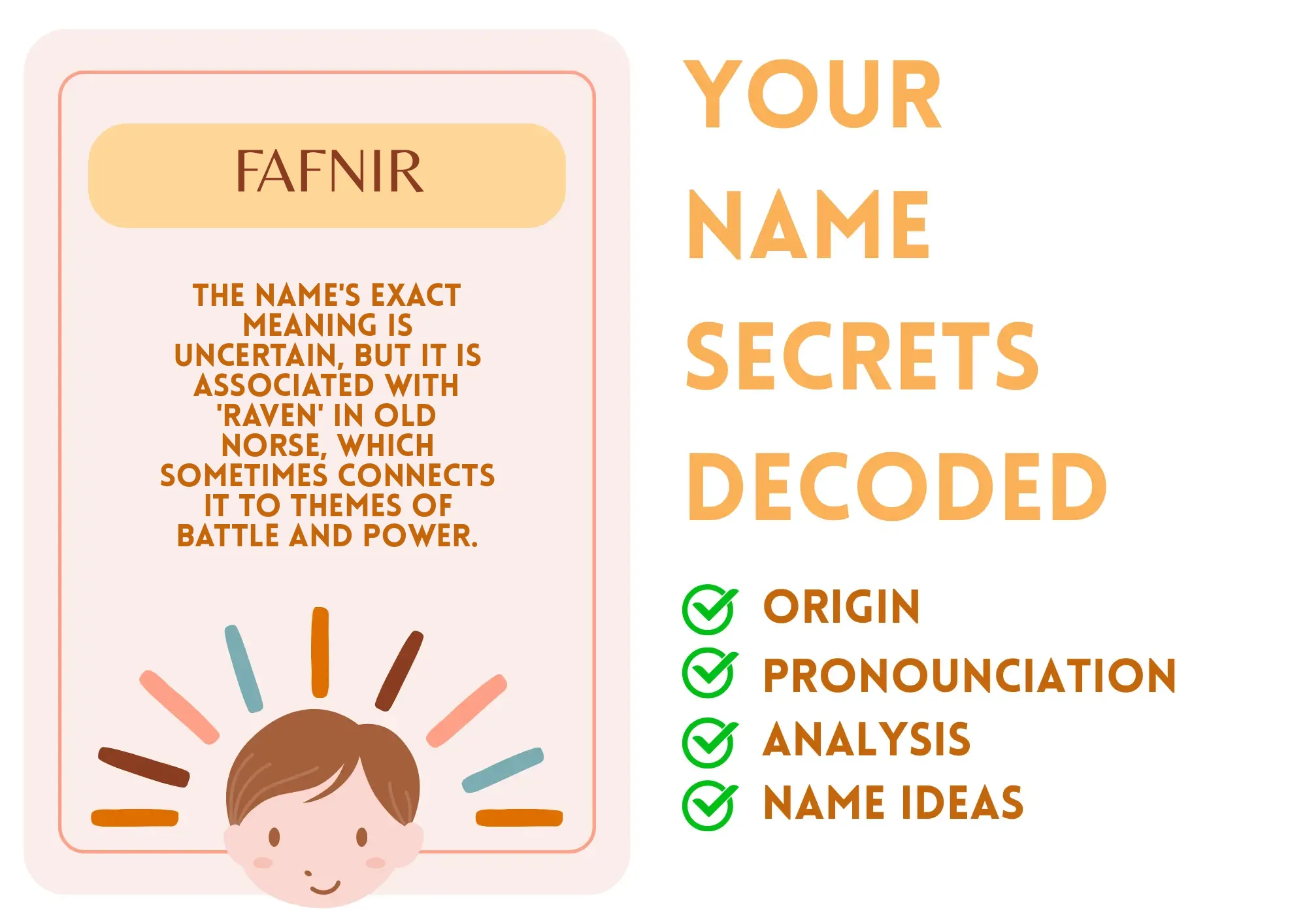
Fafnir
Fafnir is a name steeped in mythological significance, originating from Old Norse. In the legendary tales of Norse mythology, Fafnir is traditionally depicted as a powerful dragon who hoarded treasures and was turned into a beast due to his greed. The name embodies themes of transformation, greed, and tragic fall, making it rich in narrative depth.
Fafnir is perceived as a strong, somewhat sinister name, evoking the image of power and danger. It has a robust character, making it easy to write and pronounce, with its distinctive phonetic rhythm.
Fafnir's place in mythology lends it a unique charisma, even in modern contexts. Parents may choose this name for its adventurous and mythical connotation, making it appealing to those who value storytelling and heritage.
Basic Information
Gender: Boy
Sounds Like: FAHF-neer
Pronunciation Explanation: The emphasis is on the first syllable 'FAHF', pronounced like 'half' but with an 'F' sound, followed by 'neer', rhyming with 'beer'.
Summary and Meaning
Meaning: The name's exact meaning is uncertain, but it is associated with 'raven' in Old Norse, which sometimes connects it to themes of battle and power.
Origin: The name Fafnir has Old Norse origins, deeply connected to Norse mythology and legends, particularly those surrounding the Edda poems.
Usage: Fafnir is traditionally used as a masculine name, owing to its mythological roots and association with male characters in legends.
Name Number (Chaldean)
Name Number (Pythagorean)
Popularity (Global Rank)
Overall: 635859
Boys: 72681
Most Popular in
Religious and Cultural Significance
Religion: Norse Paganism
Background: In Norse mythology, Fafnir is a central figure in tales involving gods, heroes, and the fatal consequences of greed and desire. He symbolizes both the allure and danger of wealth.
Cultural Significance: Fafnir's story, particularly as a dragon and its ties to legendary hero Sigurd, carries significant weight in Scandinavian folklore. His character is an important lesson in the dangers of greed and its transformative power.
Historical Significance: Fafnir's tale appears in the Poetic Edda and the Prose Edda, where he is depicted as a formidable dragon who meets his demise at the hands of the hero Sigurd. His story exemplifies the complexities of love, greed, and fate prevalent in Norse dramas.
Popular Culture
Literature and Mythology: Fafnir is a prominent figure in Norse mythology, often referenced in literature discussing myth and heroism. His character has been explored in various adaptations and retellings.
Movies and Television: Fafnir appears in modern adaptations of Norse myths, including animated features and video games, symbolizing formidable challenges the hero must face.
Feelings and Perceptions
Perception: Fafnir is generally perceived as a powerful, dangerous, and intriguing name. Those familiar with mythology may appreciate its depth, while others might find it somewhat intimidating.
Positive Feelings: Unique, strong, mythical, adventurous, culturally rich.
Negative Feelings: Can be viewed as overly aggressive or complex, potentially difficult for some to relate to.
Practical Considerations
Ease of Writing and Calling: Fafnir is easy to write and pronounce, consisting of six letters and two syllables, making it memorable while retaining an air of otherworldliness.
Common Typos and Misspellings: Fafner,Fafner,Fafaar
Common Nicknames: Finn,Faf,Fiji
Fafnir Popularity
Fafnir Usage and Popularity By Country
| Country | Rank (Overall) |
|---|---|
| Iceland | 8499 |
| Panama | 16664 |
| Sweden | 31840 |
| Mexico | 78583 |
| United States | 344452 |
Fafnir Usage and Popularity By City
| City | Rank (Overall) |
|---|
Compatibility Analysis
Famous Persons Named Fafnir
No results found for Fafnir.
Related Names
Similar Sounding Names:
Fenrir,Fafette,Fander